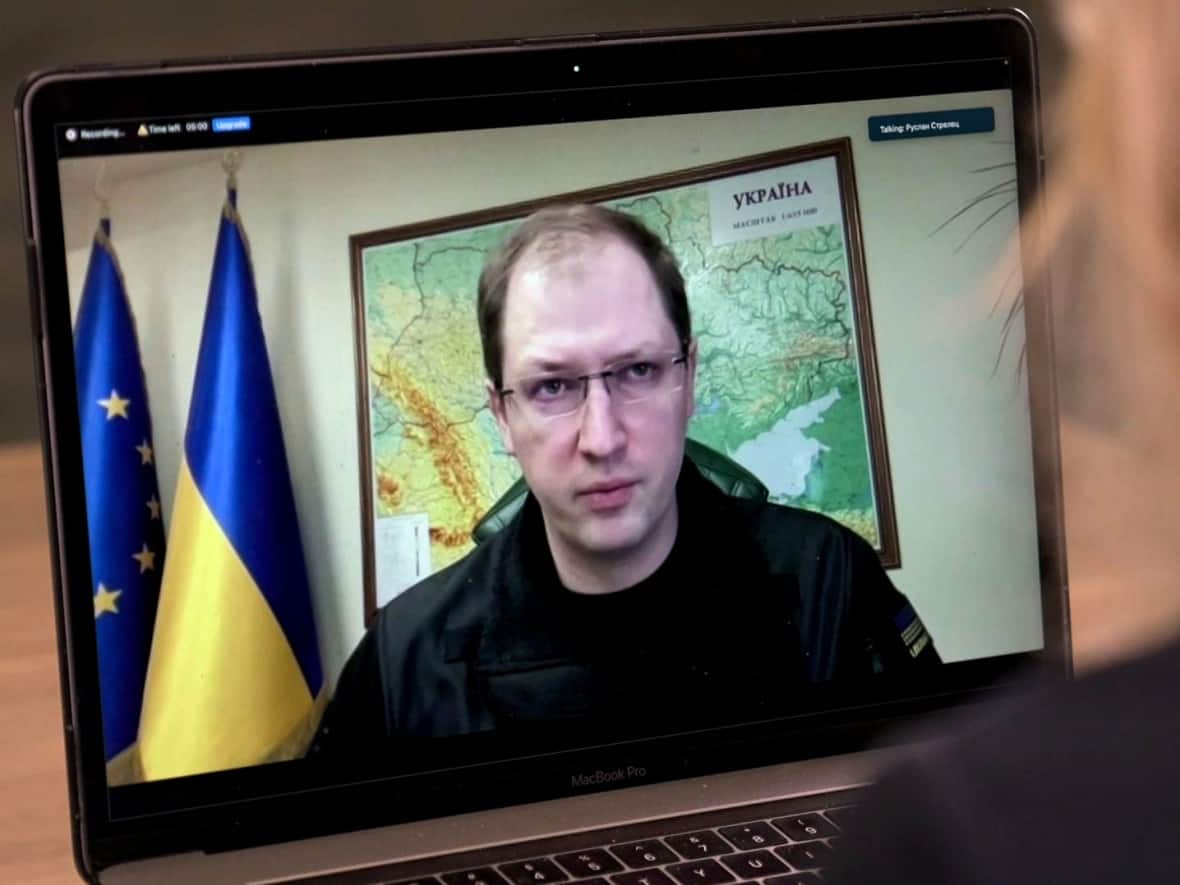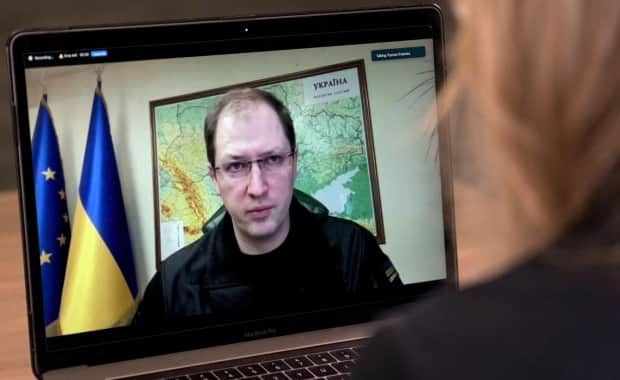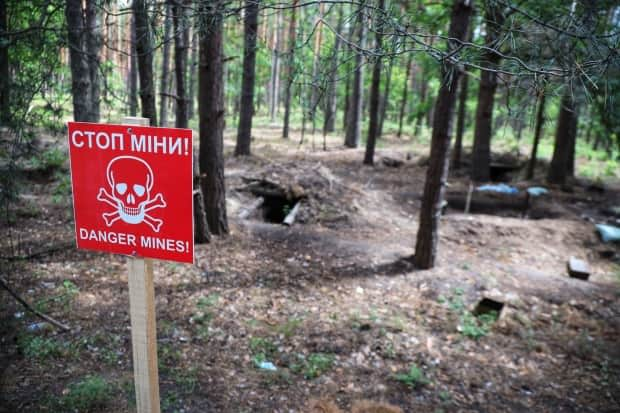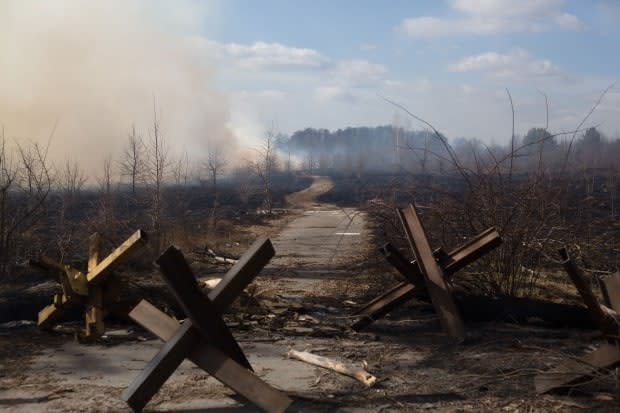Ukraine wants to make Russia pay for environmental toll of war

Missiles and mortars kill and maim people, but Russia's year-long war in Ukraine is also poisoning the air, ground and sea, says Ukraine's minister of environmental protection, who is building a case that Russia should pay for its ecological "crimes."
"We've lost some parts of our nature forever," said Ruslan Strilets in an interview from the capital, Kyiv, referring to things like contaminated groundwater and burnt forests. Ukraine estimates the total environmental damage so far is more than $48 billion US.
CBC News has been on the ground covering Russia's invasion of Ukraine from the start. What do you want to know about their experience there? Send an email to ask@cbc.ca. Our reporters will be taking your questions as the one-year anniversary approaches.
From the first weeks of the war in early 2022, inspection teams across Ukraine have been sampling, photographing and recording water and soil contamination and measuring air pollution amid a constant barrage of missiles and mortars.
In June, for example, Ukraine says Russian missiles tore into a shopping mall in Kremenchuk, killing 20 people. According to the State Environmental Inspectorate, the inferno and billowing black smoke also spewed 2,200 tonnes of pollutants into the air, including ammonia, benzopyrene and sulfur trioxide.
Air pollution has increased by three to four times since the war began, even with industrial production at only about 30 per cent of pre-war output, says the environment minister.

"In the first days of the war, I realized that war is not limited to the fears of people, but it spreads to every living thing," said Olena Kryvoruchkina, a Ukrainian MP and chief co-ordinator of the Operational Headquarters, which is collecting data and evidence of environmental ruin.
"We can quickly rebuild a bridge or a house, but it will take decades to renew the nature that they've destroyed," she said. But, she added, "we will try."
Ukraine hasn't worked out the mechanics, but it is mounting a case for ecological damage from the war to be a sizeable part of any future compensation. The huge challenge will be to prove alleged crimes in any international court and force Russia to pay.
For now, Ukraine is gathering data and building international support.
'A danger to the health of Ukrainians'
Russia's targeting of Ukrainian fuel depots and refineries, for example, has sparked massive fires that have released harmful pollutants including soot, methane and carbon dioxide. Since the invasion began, more than 600,000 tonnes of petroleum products have been burned, according to the latest statistics from the environment ministry.
"This is a danger to the health of Ukrainians. These burning oil depots and other air pollutants due to war operations end up in people's lungs, and can cause horrible illnesses," said Kryvoruchkina.
But scientists say the damage goes beyond people.
A chemical tanker struck by a Russian missile a day after the invasion began polluted the Black Sea, says Ukraine. A satellite photo taken nearly a month later shows a slick covering 2,000 square kilometres, according to Ukraine's Institute of Marine Biology.
Last summer, dead dolphins washed up on a Black Sea beach. Scientists suggest dozens may have died from military activities such as the use of sonar, which can cause "acoustic trauma" for the animals.
An estimated 15 per cent of Ukraine's agricultural land is littered with mines and other unexploded ordnances, particularly in the eastern and southern parts of the country. In January, Environment Minister Strilets visited one of Ukraine's national parks, the Holy Mountains in Donetsk region.

"I was shocked," he said. "All of the park's infrastructure is destroyed, more than 60 per cent of trees were burned."
A few hours after his visit, a park employee was severely injured when he stepped on a mine.
"Russia must be held responsible," Strilets said.
A toxic legacy
At the COP27 climate change conference in Sharm el-Sheik, Egypt, in November, Ukrainian President Volodymyr Zelenskyy said the war had destroyed five million acres (about two million hectares) of forest in the first six months.
"There can be no effective climate policy without peace on Earth," he said.
Even so, environmental damage draws less attention than the horrific human carnage of the war. Ukrainians, especially near the front lines, are just trying to survive the next week, says Strilets, acknowledging that the environment and climate change are not on their list of urgent priorities.
But conflict leaves a toxic legacy that reaches far into the future.
"Ultimately, it's a human story," said Doug Weir, research and policy director at the U.K.-based Conflict and Environment Observatory.
"Part of the problem has been that, historically, we somehow separate out environmental damage from humanitarian consequences, when we all need to breathe, we all need to drink, we all need to eat. So, environmental damage and conflict is a humanitarian issue. It needs to be perceived as such."
The Conflict and Environment Observatory is developing its own database on the war in Ukraine, with more than 700 cases logged so far, one of a number of international organizations collecting evidence.

"What's interesting about this war is it's probably going to be the best-documented conflict in terms of environmental damage that we've ever seen," said Weir.
Social media posts, photographs and satellite imagery mean one missile attack can rack up more than a hundred bits of evidence, all stored in a database.
But physical inspection is still a barrier in Russian-controlled territory or near active, shifting front lines.
'Our work is for the future'
Currently, there is no formal mechanism to pursue or prosecute environmental crimes, but there is precedent for compensation. After the 1991 Gulf War, the UN Security Council set up a Compensation Commission that bound Iraq to pay reparations for damage in Kuwait, including environmental damage.
Iraq ended up paying $52.4 billion US over three decades in compensation to more than 1.5 million claimants. (The Compensation Commission announced that the final payment to Kuwait was on Jan. 13, 2022.)
Russia's role on the UN Security Council would complicate such a mechanism in this conflict, but there may be other routes, says Weir. The UN General Assembly passed a resolution in November recommending an international registry of damages, to co-ordinate evidence.

But the wider question, says Weir, is where the money for reparations would come from. "Would Western countries freeze Russian assets and use those to help pay reparations? Environmental remediation is expensive, it's complex and it takes years."
Quantifying the damage in economic terms is also complicated. Mark Zheleznyak, known for his work assessing the cost of the 1986 nuclear disaster in Chornobyl, Ukraine, has been enlisted by the the country's State Environmental Inspectorate to help establish the methodology.
"Our work is for the future," Zheleznyak said, who is collaborating with international partners, including a scientific advisory board.
Zheleznyak says all the ongoing work will help Ukraine's remediation plans, and could be "a blueprint for wartime damage and recovery assessment in other parts of the world affected by military conflicts."
Ukraine acknowledges that in the past, some of its heavy industry — like the Azovstal steel plant in Mariupol, which is now demolished — was hugely polluting. In the near future, Strilets wants the slogan "Build Back Better" to include "Greener."
Weir said that "in many respects, this conflict is an opportunity for Ukraine to build back with a greater rollout of renewable energy in a more sustainable way, with less reliance on Russian fossil fuels."
CBC News in Ukraine: This week, join The National, hosted by CBC's chief correspondent Adrienne Arsenault in Kyiv. Watch at 9 p.m. ET on CBC News Network, 10 p.m. on CBC TV, and on streaming services CBC Gem and CBC News Explore.


